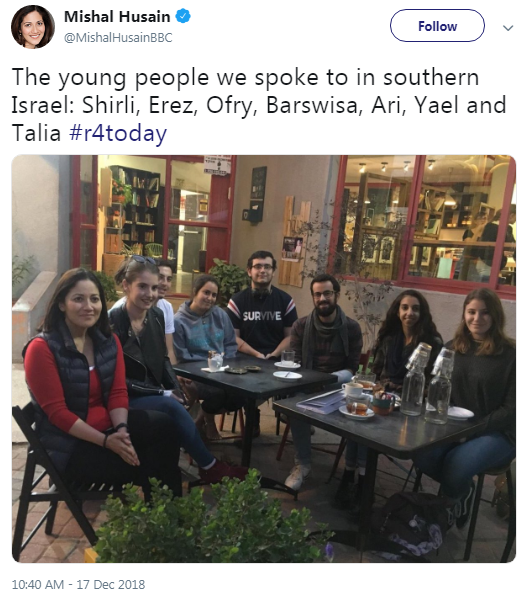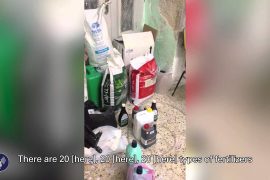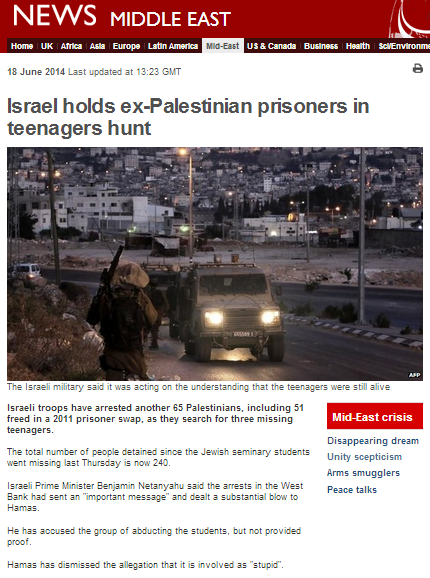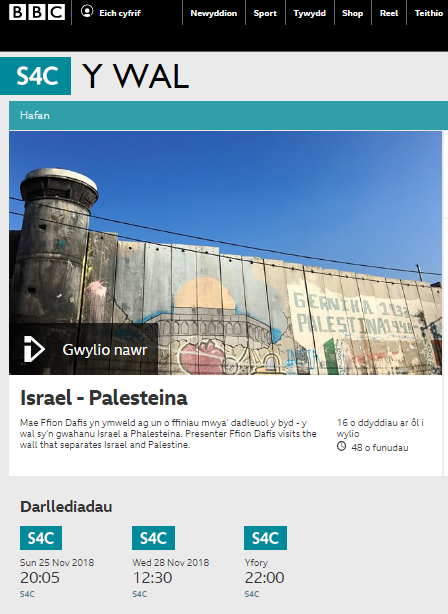As we saw in part one of this post, the first part of Mishal Husain’s BBC Radio 4 ‘Today’ programme interview (from 2:09:59 here) with the Israeli ambassador to the UK, Mark Regev, on January 18th focused on the topic of medical services in the Gaza Strip. Husain then changed the topic to the subject of the ‘Great Return March’ violent rioting which she had previously euphemistically described as “protests”.
[emphasis in italics in the original, emphasis in bold added]
Husain: “Why do you use live ammunition against people who are inside the Gaza side of the boundary fence with Israel?”
Regev: “If people are storming the fence, trying to break through to our side of the border – as the leader of Hamas said, their goal is to tear down the fence, enter Israel and kill our people – then we will stop them. People are launching Molotov cocktails and people are shooting. If people are launching incendiary devices to burn our fields, burn our…”
Husain [interrupts]: “Yes but you’re saying quite a few different things ‘cos storming the fence…OK…let me just give you an example of someone who presumably was considered to be storming the fence. There are pictures of a 14 year-old called Othman Helles who, with a group of other boys – and it’s very clear that they’re a very young age, this was last summer – they go up to the fence. He puts his hand on the top of the fence and immediately there’s a bullet that hits him in the chest and he dies on the spot. Now it is apparent to anyone looking at those pictures – as it would have been to the Israeli soldier who fired that shot – that these were children. Why were they shot?”
Regev: “I think if you are trying to break down the fence, if you’re trying to – as Hamas itself declared – tear through the fence, go to those Israeli communities…”
Husain [interrupts]: “You put your hand on the top of a fence, you’re a child and you’re shot dead by an Israeli soldier.”
As Mishal Husain should be aware, her portrayal of that story does not align with the account of the same incident given by her colleague Tom Bateman to Radio 4 listeners in August 2018.
Bateman: “A BBC crew in Gaza was filming as Othman Helles, away from the fence, used a sling to throw a stone towards Israeli soldiers. A few people burned tyres. Later the 14 year-old walked alongside the fence, put a hand and a foot on it and pulled himself up about a foot off the ground. He was hit with a single shot to the chest. Nineteen of those killed since the end of March have been under the age of 18. The number of children with bullet wounds is more than 600 according to the UN’s humanitarian affairs agency [UN OCHA – Ed.] which bases its recent figures on those of Gaza’s health ministry [i.e. Hamas – Ed.].”
Husain of course did not bother to inform listeners that when Othman Helles tried to climb the border fence, Hamas had been deliberately using youths to sabotage the border fence throughout the weeks of violent rioting and that among those killed under the age of 18 were operatives of terror factions and others linked (e.g. by family) to such factions.
Regev: “First of all you’re talking about a combat situation where hundreds if not thousands of people brought in by Hamas, paid for by Hamas, are storming the border fence, trying to break it down. Countless incidents where they actually had broken through the fence with their wire cutters…”
BBC Radio 4’s self-appointed military expert interjected:
Husain [interrupts]: “Have you ever thought of arresting people?”
Regev: “We do arrest people when we can. We do arrest people when we can but I think if you look at the film from those violent riots at the border, it’s clearly orchestrated by Hamas, it’s clearly violent in intent. The goal – as articulated by Hamas itself – is to break in and kill our people.”
Husain: “But there are people being…there are people being shot dead far inside the fence. I mean I’ve been to the fence and I’ve seen…”
Regev: “So have I.”
Husain: “…there are women – you’ve been to one side. I’ve been to the other side where people are gathering. But there are women there. There are children there. There are people there who are just seeing what they’re doing and there are people far inside the fence who are sometimes hit by live ammunition but also by tear gas canisters. There was a 13 year-old who died from being hit on the head with a tear gas can.”
Regev: “Mishal, I’d like to ask you the following question: everyone who listens to this programme, everyone who knows anything knows that that is a war zone. So why are you busing women and children into a combat zone? And I’d ask one further question…”
With her ‘objectivity’ and ‘impartiality’ on full view Husain interrupted her interviewee yet again:
Husain [interrupts]: “It’s a combat zone though because you’re using live ammunition – that’s why it’s a combat zone.”
Regev: “It’s a combat zone because we are protecting our border against people who are trying to use explosives and other weapons to break in so as to kill our people.”
Husain: “So you don’t…when you hear about the children for example or the medics – there was a young medic who also died inside, inside the fence – when you hear about people like that who’ve paid for being at the fence with their lives, do you never have any kind of qualms about the policy that Israel’s pursuing?”
Regev: “I don’t want to see any innocent person caught up in the cross-fire between us and Hamas: I want to be clear about that. But I’d ask you the following question: in Gaza we pulled out. We redeployed behind the 1967 line which is from the international community’s point of view the recognised border. If we can’t defend that border, what border would you have us defend?”
Husain: “The question is how you defend it and the tactics that you chose to use to defend it.”
Regev: “We are preventing – so far successfully, thank goodness – people, terrorists, from entering our communities and killing our people. You spoke to the Israelis at the southern border who live in fear of terrorists coming across the border and killing them and their children. It is our obligation as a government to protect our people and we will do so.”
Husain did indeed speak to Israelis living near the Gaza border during her December visit but as readers may recall, her main interest – as expressed in 60% of her questions – was asking them about Palestinians.
Husain then changed the subject.
Husain [2:20:59]: “Let’s talk about another border: the border with…eh…in northern Israel – the border with Lebanon – where recently you found tunnels that you say have been dug by Hizballah. Ahm…given Hizballah’s links to Iran and the wider situation in the Middle East, how do you feel about President Trump – who Mr Netanyahu is so close to – deciding to pull US troops out of Syria and the…and also saying that Iranian leaders can do what they want in that country?”
After Mark Regev had answered that question and a subsequent one – “So does President Trump’s decision make Israel less safe?” – Husain closed the interview.
As we see Mishal Husain once again used this interview to advance her chosen narratives concerning Israeli counter-terrorism measures while both promoting inaccurate claims and withholding crucial background information from BBC audiences.
We await with interest the ‘Today’ programme’s interview with the Egyptian ambassador to the UK on the topic of the effects of his country’s counter-terrorism measures on life in the Gaza Strip, the interview with the PLO envoy to the UK on the issue of the Palestinian Authority’s withholding of medicines, permits for medical treatment in Israel, salaries and funding for fuel supplies to the Gaza Strip and of course the interview with a Hamas representative on the topic of the group’s prioritisation of terrorism over social and health care, clean water supplies and sewage treatment for the citizens of the Gaza Strip.
Related Articles:
BBC Radio 4’s ‘Today’ on the Gaza Strip – part one
BBC’s Mishal Husain fosters a narrative with airbrushed statistics
‘News at Ten’ continues the BBC’s ‘blockade’ campaign
BBC Radio 4’s selective framing of the “hardships” of Gaza Christians
BBC Radio 4 ‘Today’ Gaza Strip special – part one
BBC Radio 4 ‘Today’ Gaza Strip special – part two
BBC Radio 4 ‘Today’ Gaza Strip special – part three
BBC Radio 4 ‘Today’ Gaza Strip special – part four
BBC Radio 4 ‘Today’ Gaza Strip special – part five
Mishal Husain does ‘life in Gaza’ for BBC One TV
The BBC’s monochrome framing of Gaza’s chronic utilities crisis
The common denominators in the BBC News website’s Gaza reporting




